“What Are Little Girls Made Of?”
Written by Robert Bloch
Directed by James Goldstone
Season 1, Episode 9
Production episode 6149-10
Original air date: October 20, 1966
Stardate: 2712.4
Captain’s log. The Enterprise arrives at Exo III. They’re in search of Roger Korby, an archeologist who hasn’t been heard from in five years. It turns out that Chapel is his fiancée, and she gave up her career in bio-research to sign onto a starship as a nurse in the hopes of finding him. Two previous expeditions have failed to find him—but Uhura gets a response to her signal from Korby himself. The doctor insists that Kirk beam down alone, but when Kirk reveals that Chapel is on board, he is thrilled, and agrees to have them both transport to a cavern on the surface, one that’s protected from the sub-zero temperatures by a transparency.
There’s no one to greet them, so Kirk orders Spock to beam down two security guards, Mathews and Rayburn, as a precaution. Rayburn stays at the landing site while Mathews joins Kirk and Chapel to search for Korby in the caverns. At one point Chapel almost falls down a deep chasm. They move forward to find Korby’s assistant, Brown. Then behind them, Mathews screams, and they run back to discover that he’s fallen down the chasm. (In the background, we see a big bald guy sneaking away.) Brown seems oddly unconcerned about Mathews, and it takes him a second to acknowledge Chapel, which she finds weird.
Kirk informs Rayburn that Mathews is dead and orders him to report to the Enterprise and have a security team standing by. As soon as Rayburn signs off, and before he can contact the ship, the big bald guy kills him, too.
Brown informs them that Korby has discovered that the civilization on Exo III moved underground after their sun started to cool. They arrive at a well-appointed sitting room, where they meet the scantily clad Andrea (at whose presence Chapel is nonplussed) and eventually Korby himself, who greets Chapel with a sloppy wet kiss.
However, when Kirk can’t get through to Rayburn and tries to contact the ship, Brown pulls a phaser on him. Andrea tries to disarm Kirk on Korby’s order. She fails, and Kirk fires on Brown—revealing him to be an android. The big bald guy shows up and throws Kirk into the wall. Korby identifies him as Ruk, and he takes Kirk’s communicator and checks in with Spock while doing a perfect impersonation of Kirk’s voice.
Ruk is an android and can not only impersonate people, he also protects Korby and his work. He was tending the machinery when Korby and his team arrived, ever since the native population died out. Korby admits that Ruk killed both Mathews and Rayburn. Korby says he needs twenty-four hours to convince Kirk of the importance of his work before he’ll allow Kirk to report it to anyone else. He says it’s for fear of lay people’s ignorance sabotaging his discovery. However, as a make-good gesture, Korby orders Ruk to obey Chapel’s orders as if they were Korby’s own.
Korby used the knowledge gained from studying Ruk to build Brown. Kirk decides that Korby’s completely binky-bonkers, cluck-cluck, gibber-gibber, my-old-man’s-a-mushroom nuts, and tries to run away, getting thrown across the room by Ruk for his troubles.
Andrea goes to see Chapel, asking why the nurse is unhappy when she’s been reunited with her fiancé. Andrea also notices that Chapel’s upset when she calls Korby by his first name—at which point Korby enters with Ruk and Kirk and orders her to refer to him formally moving forward.
Andrea reveals that she is also an android. On Korby’s orders, she kisses Kirk, then slaps him. Korby insists that he has no feelings for her and she has no capability of feeling anything. (This, of course, doesn’t preclude other possibilities, something that the look on Chapel’s face indicates she’s fully aware of. Besides, someone taught Andrea how to kiss…)
Korby has Ruk strip Kirk down and put him on a roundabout-thingie, and Ruk places a dummy of some kind on the other side of it. Andrea starts the machine up, and it starts to whirl around like a centrifuge.
Chapel is appalled—the Korby she knew wouldn’t hurt a fly, much less do all these awful things, but Korby insists that just beaming up to the ship with Brown and Andrea and Ruk would make them all figures of curiosity and gossip.
When the whirligig stops turning, there are two Kirks. Chapel can’t tell them apart. Korby explains that the general organs are in place, and then are altered to duplicate the subject. The machine also makes a copy of Kirk’s mind. Just as Korby starts that process, Kirk starts muttering, “Mind your own business, Spock—I’m sick of your half-breed interference” over and over.
Andrea serves lunch to Chapel and Kirk. Chapel and Kirk discuss Korby—Chapel is concerned about him, but she knows him well enough to say that he’s sane. Kirk then asks what she’d do if he gave her a direct order to betray him. She begs him not to force that choice on her—she’d rather he push her off the ledge where Mathews died.
Only then does “Kirk” reveal that he’s the android. Korby then enters with Ruk and the real Kirk, who’s now wearing one of the green-and-blue jumpsuits that Korby, Brown, and Andrea are all wearing variations of. Kirk tests the android’s memory with questions about his brother.
Korby explains that transferring humans to android bodies can grant humanity immortality. No more death, no more hatred, no more jealousy. Kirk points out that that also means no more love, no more passion, no more sentiment.
Kirk manages to escape by threatening Korby with rope he pulls off the fancy wooden chair he’s sitting on. Ruk goes after him; Chapel, appalled at what Ruk might do, goes after Ruk. Kirk arms himself with a stalactite that doesn’t look at all like a giant dildo. (It totally looks like a giant dildo…) Kirk hits Ruk with the stalactite, which proves futile, and Ruk knocks him over a cliff. Then, having been ordered by Chapel not to harm Kirk, Ruk pulls him up.
Meanwhile, the android Kirk has beamed aboard the Enterprise in order to go into the safe in the captain’s quarters and take out the documents showing their next several missions. Korby is looking for a planet to start surreptitiously seeding androids. When Spock tries to talk to him, the android bellows, “Mind your own business, Spock—I’m sick of your half-breed interference!” Realizing that something is up, Spock orders a security detail to stand by and beam down with him after the captain has returned to the surface.
When Andrea comes to take Kirk’s dinner tray away, he orders her to kiss him. She does, then starts to slap him. He stops her and then gives her a real kiss—a manly, Kirk-like kiss. She’s all verklempt, saying she’s not programmed for him.
She runs off, and Ruk keeps him from going after her. Ruk admits that the previous inhabitants of the world—“the old ones,” he calls them, ’cause he knows his Lovecraft—were too illogical. They started to fear the androids, and the androids became frustrated with their illogic, so they overcame their programming, as the need for survival outweighed all other considerations, and they wiped out the old ones.
Ruk remembers all this at Kirk’s prompting, which then causes Ruk to try to kill him, making it not one of Kirk’s better strategies—but then Korby and Chapel enter, and Ruk shifts his animus to the doctor for bringing the evil back. Korby is forced to phaser Ruk out of existence. Kirk then jumps Korby, which isn’t very effective, but in the scuffle, Korby’s artificial skin rips off, and he’s revealed to be an android.
Korby finally tells the truth. He was frozen, dying, having lost his legs to frostbite. All he had was his mind, and he was able to put his consciousness into the android body.
His ranting and raving is interrupted by an alarm—Spock’s landing party. He sends Andrea to deal with it. En route, Andrea sees the android Kirk and thinks he’s a) the real Kirk and b) the intruder Korby was talking about. She announces that she’ll kiss him. He refuses, as it’s illogical, so she shoots him. (Tough date…)
When she reports to Korby, she’s shocked to see the real Kirk. Kirk questions Korby’s perfect new world, considering that it involved Korby shooting Ruk and Andrea shooing the android Kirk. Kirk convinces Korby to hand over his phaser, but Andrea refuses, instead going to Korby, saying she loves him (I guess that’s who she was programmed for, surprise, surprise), and then kisses him, depressing the trigger on the weapon as she does so. They’re both vaporized.
Spock arrives to see only Kirk and Chapel, and the captain announces to his first officer that Korby was never there.
Back on the ship, Chapel decides that she will stay on the Enterprise as a nurse rather than go back to her career in bio-research, and Spock gives Kirk a hard time regarding his use of the term “halfbreed.”
Can’t we just reverse the polarity? The society on Exo III learned the secret of transferring human consciousness into robotic bodies, but the androids rebelled and killed the humans, as they were too illogical. Then Ruk stood around with his thumb up his ass for millennia until Korby showed up…
Fascinating. When Spock asks Chapel if she’s sure the voice they hear is Korby, Chapel just stares at him and asks, “Have you ever been engaged, Mr. Spock?” He doesn’t actually answer; the reasons for his reticence will become clear in “Amok Time.”
I’m a doctor not an escalator. This is one of only three non-pilot episodes in which McCoy does not appear, the others being “The Menagerie, Part II” and “Errand of Mercy.”
Hailing frequencies open. Uhura’s presence is limited to contacting Korby. Very exciting stuff.
Go put on a red shirt. Mathews and Rayburn have the odd distinction of being the first-ever redshirts. This is the first time that security guards have beamed down to the planet only to be killed not long after arrival. It’s sufficiently novel this early in the show that Kirk actually cares about the fact that it happened and continues to mention it throughout the episode.
No sex, please, we’re Starfleet. Given the way she’s dressed, and given how she responds to Kirk’s kiss—that she’s not programmed for him—it’s pretty obvious that Korby created Andrea as a sex toy for himself.
Channel open. “Eating is a pleasure, sir—unfortunately, one you will never know.”
“Perhaps. But I will never starve, sir.”
Kirk and his android duplicate pointing out the pros and cons of mechanical life.
Welcome aboard. Majel Barrett firmly establishes Chapel as recurring in this episode, which also establishes her last name (she was identified only as “Christine” in “The Naked Time”). The only other recurring regular in the episode is Nichelle Nichols as Uhura.
Ted Cassidy makes his second appearance, also his first one onscreen (and only time credited), as Ruk, having provided the voice of the fake Balok in “The Corbomite Maneuver.” He’ll be back as the voice of the Gorn captain in “Arena.”
Michael Strong plays Korby, Sherry Jackson plays Andrea, Harry Basch plays Brown, and Budd Albright and Vince Deadrick play the two redshirts.
Trivial matters: This is the first of three writer credits on the show for Robert Bloch, best known as the author of the novel Psycho, which was famously adapted into a film by Alfred Hitchcock. Bloch would go on to write two other horror-themed episodes, “Catspaw” and “Wolf in the Fold.” Bloch’s script was given a last-minute page-one rewrite by Gene Roddenberry, with new script pages coming in during filming, causing filming to go over by two days.
In Bloch’s original script, the Enterprise was hired by a wealthy socialite to find Korby. Roddenberry rewrote it to someone with more of an emotional connection to Korby, and further made that person the character played by his then-lover and later wife.
This episode reveals the existence of Kirk’s brother, George Samuel Kirk. Kirk is the only one who calls him “Sam,” and he, his wife, and three kids saw him off when he took command of the Enterprise. Sam, his wife Aurelan, and one of his kids, Peter, will be seen in “Operation: Annihilate!” His other two nephews are never seen onscreen, though they do play a role in the novel The Last Roundup by Christie Golden. Sam seeing Kirk off to command the ship was dramatized in Vonda N. McIntyre’s Enterprise: The First Adventure.
Kevin Ryan fleshed out the characters of Mathews and Rayburn in the Errand of Vengeance trilogy—among other things, that Mathews was a Klingon agent planted on the Enterprise. The two also appeared at Lee Kelso’s memorial service in the My Brother’s Keeper novel Constitution by Michael Jan Friedman. Friedman’s first-ever Trek novel was a sequel to this episode called Double Double.
Jeffrey Lang’s 2002 novel Immortal Coil was a look at the entirety of artificial intelligence in the Trek universe, including a more detailed look at Exo III and the fate of the old ones…
Budd Albright, who played Rayburn, also served as William Shatner’s body double in the episode.
Gene Roddenberry previewed Star Trek at the 24th World Science Fiction Convention in Cleveland, Ohio in September 1966, shortly before the show debuted on NBC. He showed “Where No Man Has Gone Before,” and also hired a model to wear the costume Andrea wore in this episode. The latter was, by all accounts, a big hit.
To boldly go. “Dr. Korby was never here.” Every cliché and stereotype has its origins somewhere, and we get a couple of Trek’s biggest here, starting with the oh-so-expendable security guards, and continuing to Kirk using his rhetorical skills to make mechanized beings go blooey. In this case, he doesn’t so much make Ruk go on the fritz as remember what he did to the old ones.
I feel like Kirk made all the wrong arguments to Korby. Or at least made them backwards. Korby was speaking very generally when Kirk started comparing him to various despots. It isn’t until later that he mentions his plot to slowly introduce his androids into the population, covertly so no one will notice at first. That’s when his plan really starts to get oogy.
A lot of things in this episode don’t make sense, starting with the furniture—what, was all this wooden furniture with rope on it just lying around for thousands of years? And where’d the food come from, if there hadn’t been anybody on Exo III who ate food for ages and ages? And if Chapel had such a promising career in bio-research, why is she staying a nurse on the Enterprise? (Well, because she’s sleeping with the producer, but never mind…)
Worse, this is the first episode to lose the feel of the wider community of the Enterprise. It’s pretty much entirely the Kirk-and-Chapel show, with Spock’s role minimal, and Uhura’s even minimal-er. After all the buildup of Kirk planting the snotty comment in his android duplicate, that hint does no actual good—by the time Spock beams down, it’s all over. The Enterprise may as well be empty for all that anybody else on the ship matters.
The episode has its moments, from Michael Strong’s emotional performance as Korby—making the revelation that he’s a machine more powerful, especially given the flatter affect of Andrea and Brown—to Ted Cassidy’s voice and physicality making Ruk far deeper (er, so to speak) than written, to Sherry Jackson looking really hot in the outfit. But the episode could’ve done far better with its themes.
Warp factor rating: 5
Next week: “Dagger of the Mind”
Keith R.A. DeCandido’s latest story is “Down to the Waterline,” a story featuring Cassie Zukav, weirdness magnet, and taking place in Key West, Florida. It involves nixies, scuba diving, rock and roll, the ghost of a wrecker captain, and the evils of spam filters. It’s available for free on Buzzy Mag online.










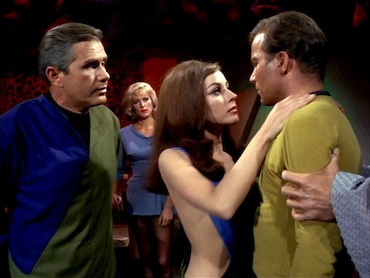
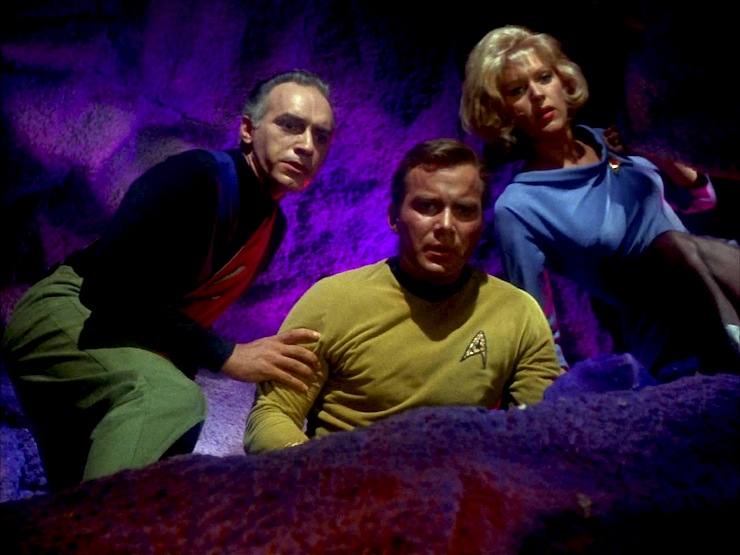
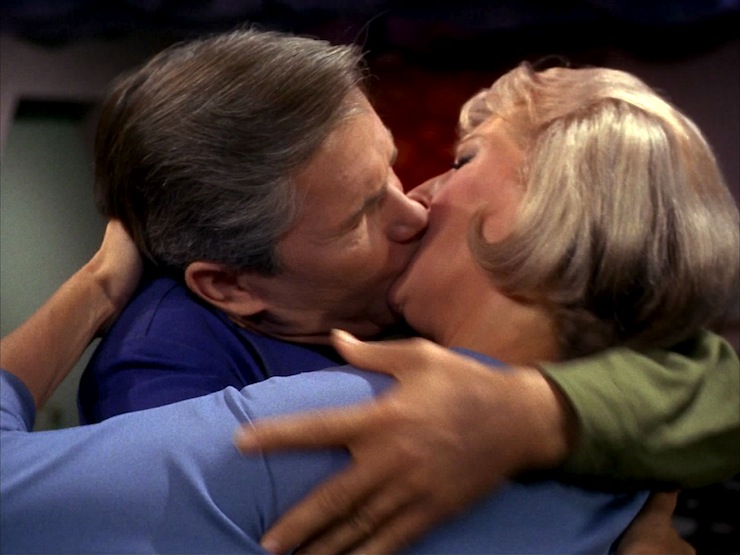
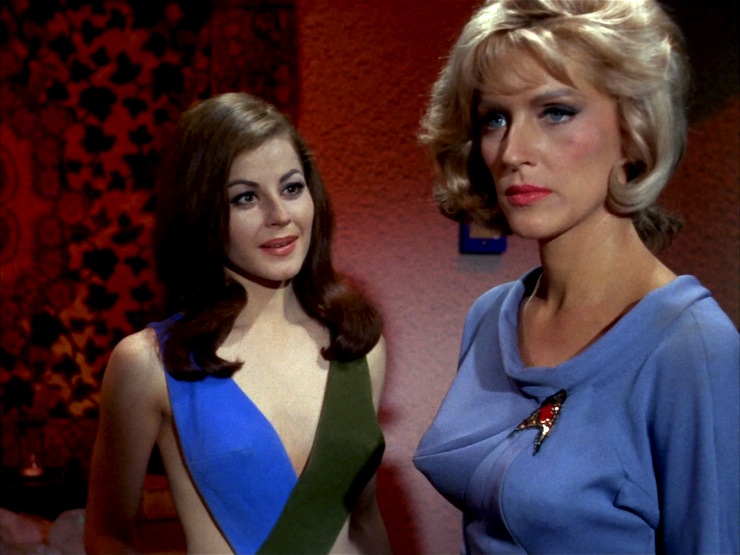
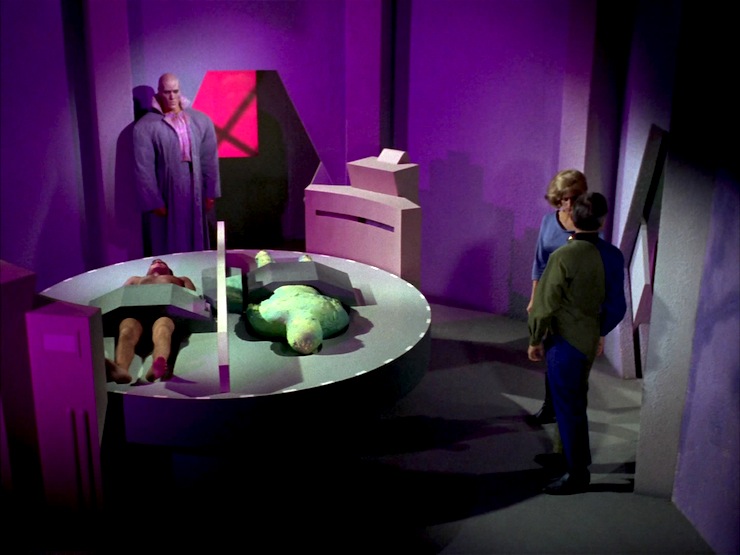
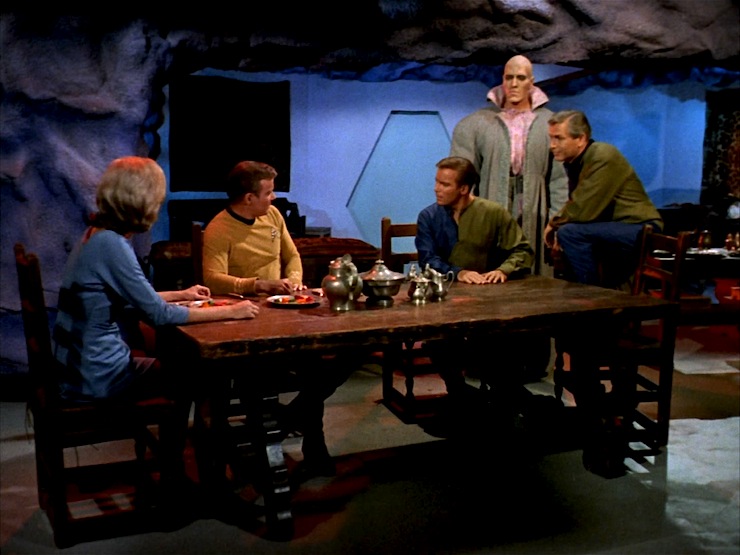
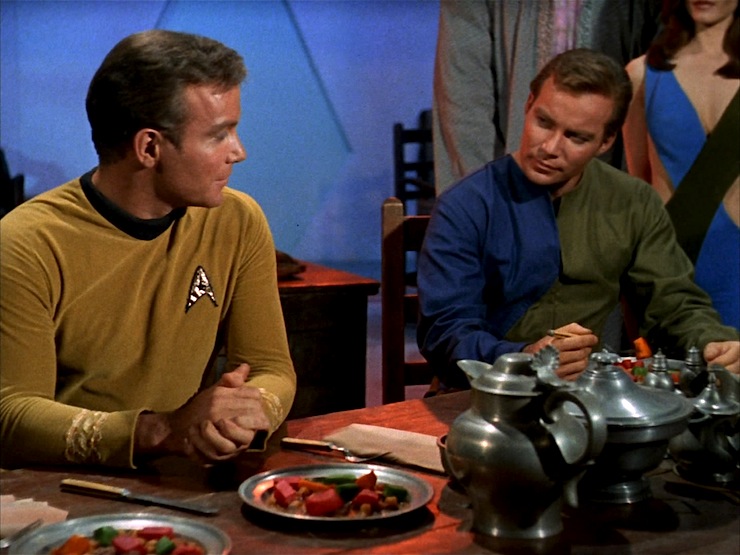
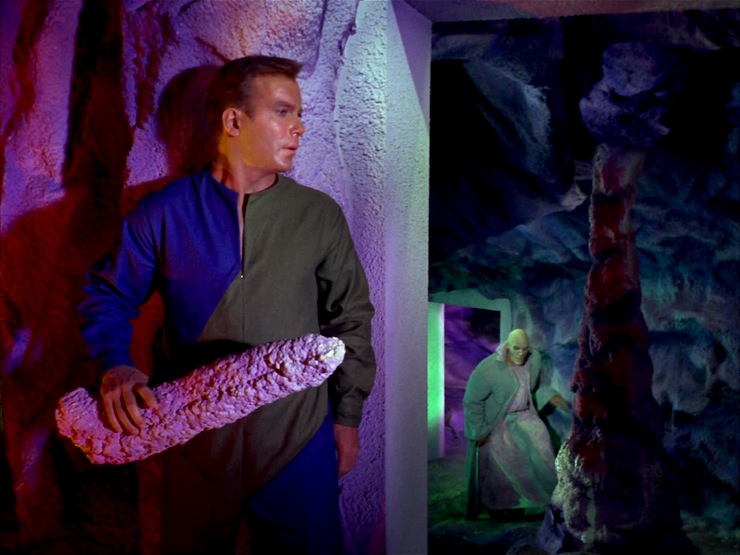
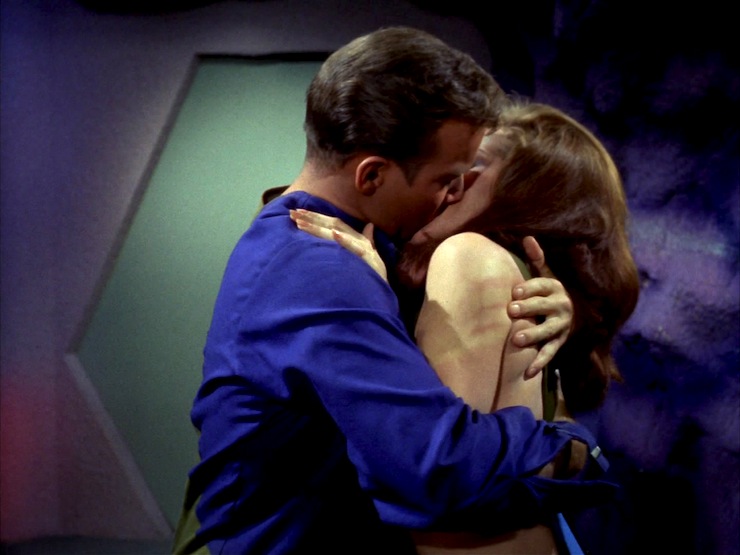
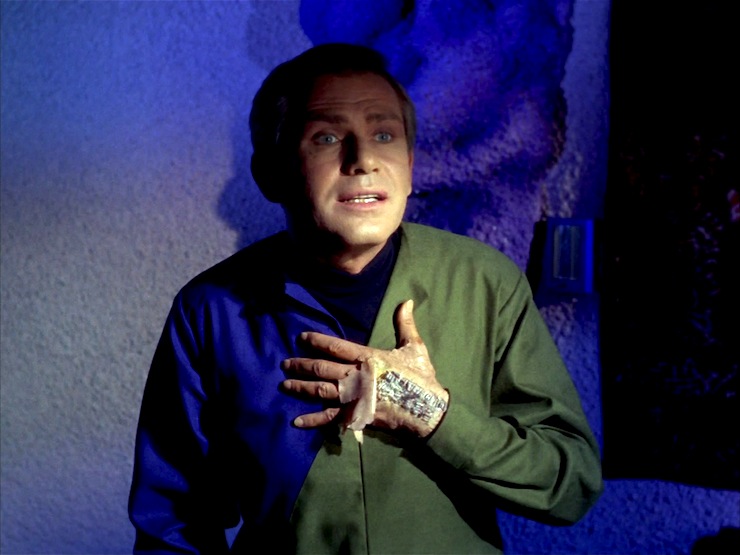
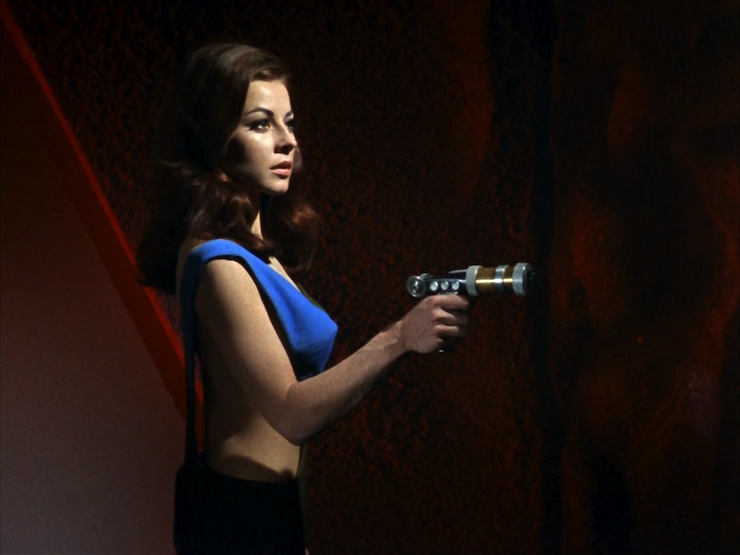
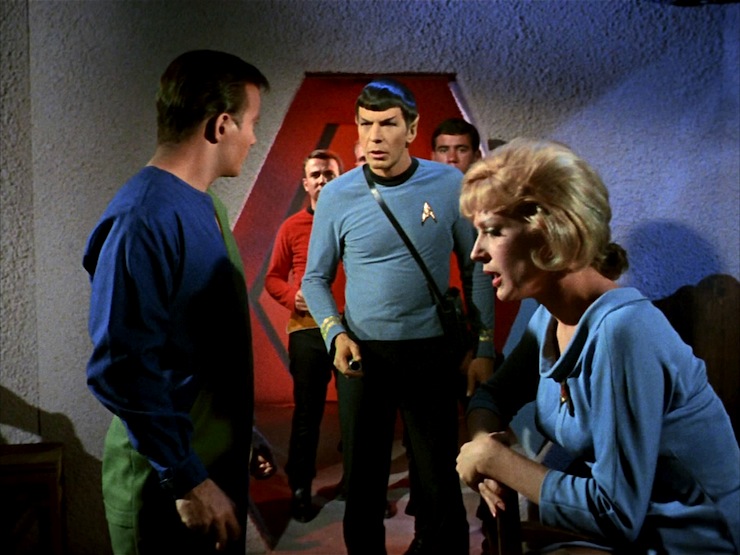
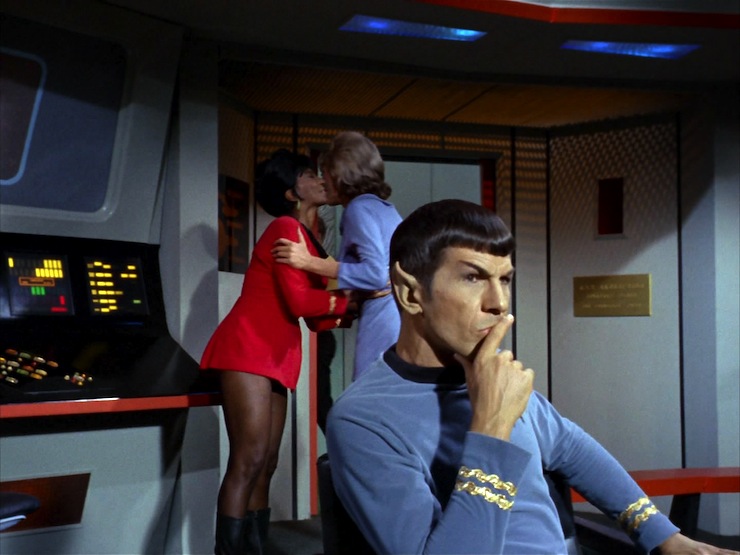
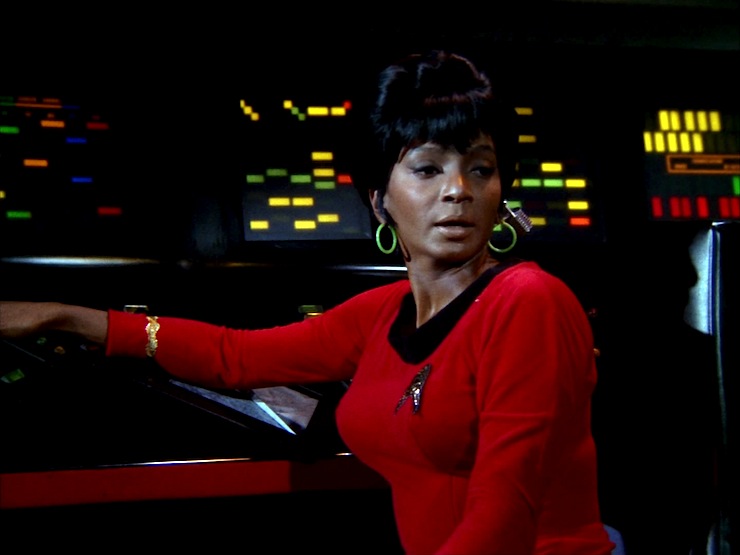
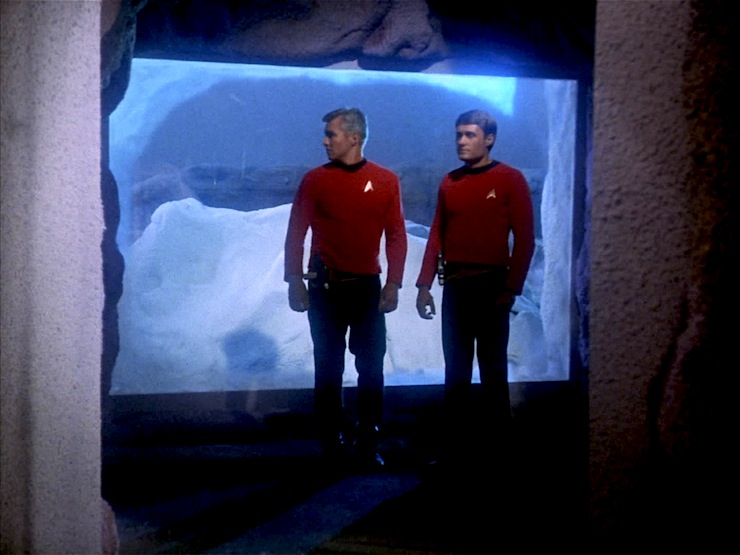
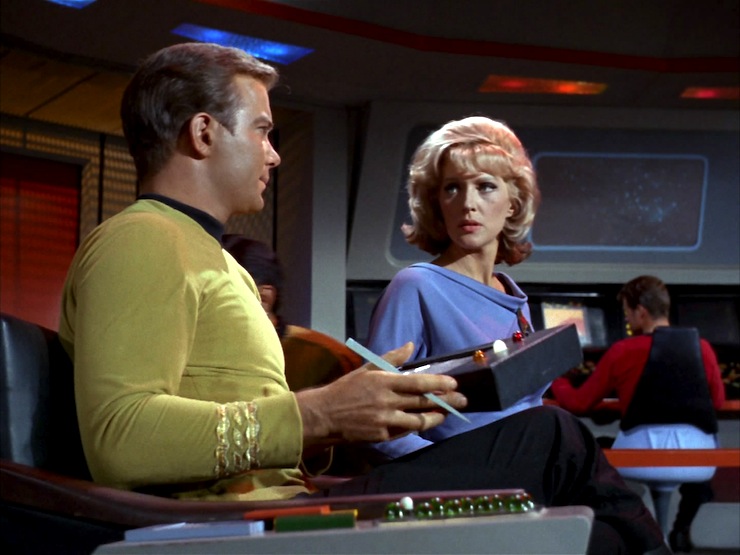
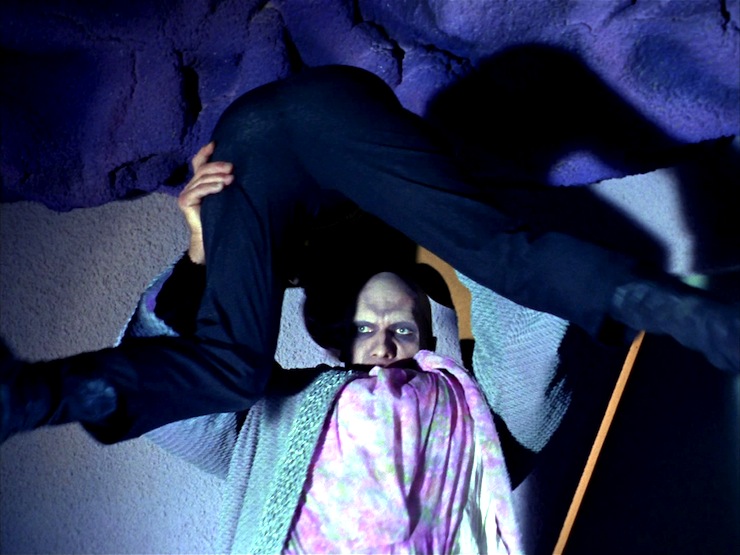
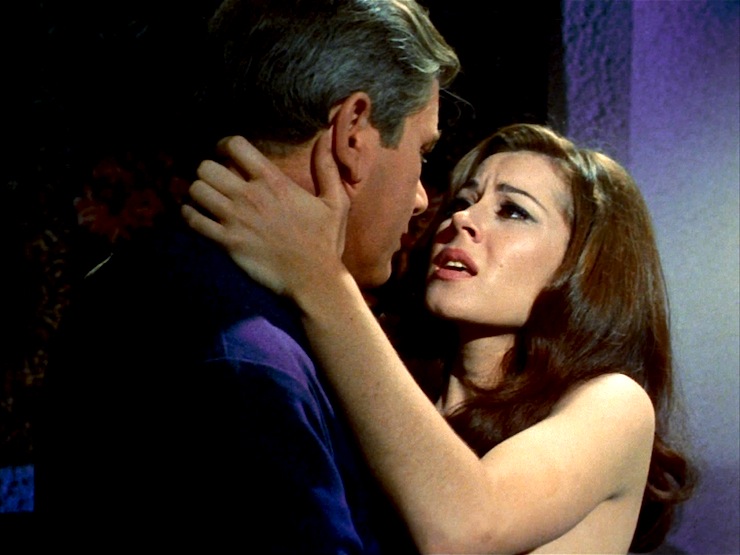
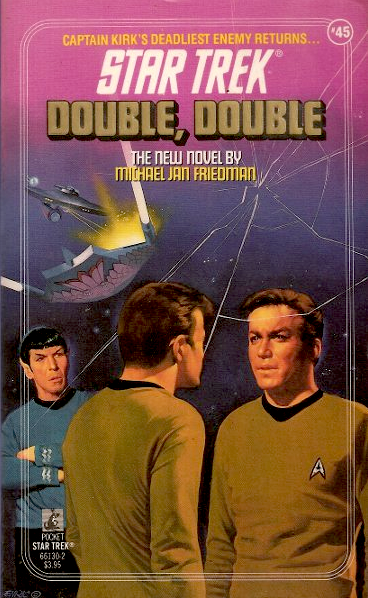
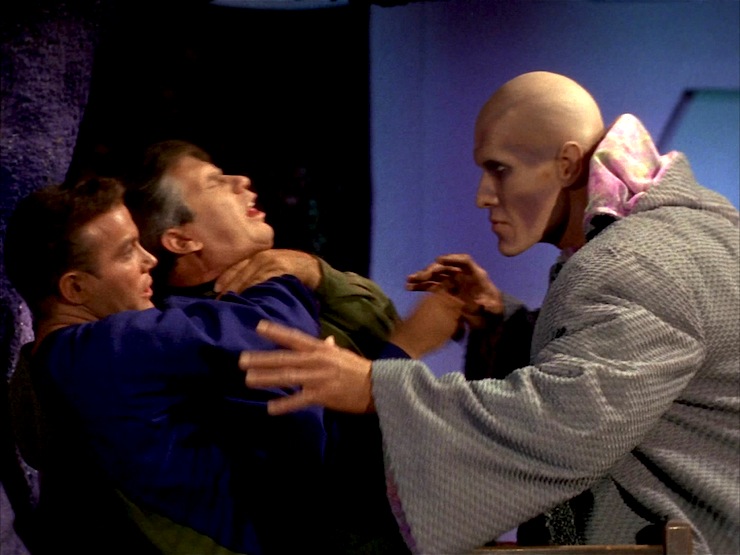
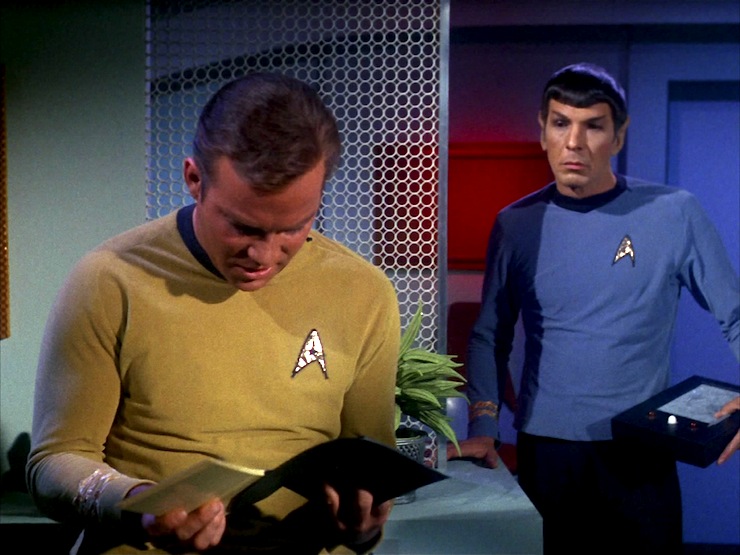
Another great write-up, Keith, although I like the episode more than you do–admittedly, more on the strength of the creepy atmosphere than on its content. Like you, I give Michael Strong props for a very compelling performance — talk about passing the Turing test! — and I have always been fascinted by Ruk and his hints about “the Old Ones.” I read Double, Double a long time ago, but remember nothing about it. I’m more than overdue for a re-read.
And, again, you’ve taught me something I never knew. I had never noticed McCoy’s absence in this episode. It’s especially odd, since our lead crew member character this week, apart from Kirk, is the only other person from Sickbay we regularly see!
I just saw Ex Machina last weekend. While it’s clearly the superior production, the questions it raises aren’t all that different from the ones raised here. What makes a human being human–and when, if at all, do artificial life forms cross the line and become “human” themselves?
@1
Certainly a recurring theme across the franchise. Look at Data’s entire arc across TNG and the subsequent movies, where they spent enough time on the subject to give the question the attention it deserves.
This did kind of hit all the cliches of ’60s robot stories — the androids are just automatons, slaves to their programming and unable to handle “real” emotion. Which I’ve always found a silly notion, because emotions are the closest thing we have to programming. They’re not something we learn or choose to feel; they’re inbuilt, automatic responses to stimuli. They’re basic responses found in animals — fear, lust, aggression, social bonding, all very primal and hardwired. And in animals, they’re fairly simple — you feel something, then you act on it. What makes emotion complicated for humans is its interaction with our intelligence and abstract ideas — such as resisting fear and choosing to face danger out of a higher philosophical ideal, or refusing to act on sexual desire due to your moral beliefs or your standards of propriety. So it should be far easier to equip an AI with emotional responses than to make it capable of abstract reason. This is a myth Star Trek never outgrew (see: Data), and it started here.
It also had kind of a weak ending, the way the androids just sort of randomly go haywire and start blasting each other at the slightest provocation. It’s not clear at all why Andrea chooses to kill herself and Korby; it’s just a convenient way to wrap up the episode. Plus it’s kind of whiplash-inducing to establish Chapel as someone who joined the service to find her fiance after she was introduced as someone in love with Spock.
Still, it’s got some decent split-screen effects (though the duplicating machine is a pretty silly design), it’s got Ted Cassidy, and it’s got Sherry Jackson in that fantastic outfit. Plus it’s got another of Fred Steiner’s memorable partial scores that ended up being tracked throughout the rest of the season. His romantic theme for Andrea (which is a variant of the same motif used more aggressively for Ruk) was reused as Kelinda’s theme in “By Any Other Name.”
Double, Double is kind of an interesting novel, showing a scenario where Korby’s plan is actually enacted — Kirk replaced by a duplicate, androids seeded on other planets. (Turns out there was a second Brown android who survived and set Korby’s plan back into motion, IIRC.) The problematical thing about it, though, is that Chekov is onboard and there are references to third-season episodes, even though it’s supposed to be mere weeks after “Little Girls.” That always confused the heck out of me.
Thank you for the rewatch!
Yes… this is a weird episode, but it has its moments, my favourite one being Kirk’s conversation with his android duplicate.
I don’t mind that Kirk’s “message” to Spock doesn’t do any good (and I enjoy that he calls it a “message”), because I like it that he tries a lot of things here – running away, confounding Andrea by kissing her, talking Ruk into rebellion… until one of them actually works. He doesn’t just send Spock a message and hopes for the best, he keeps coming up with new ideas.
And Uhura does more than just contacting Korby, she also hugs Chapel before she leaves the bridge (it’s in one of your screenshots). That was a sweet little scene in the background.
This is an episode I love not because of the actual story, but because of its design elements – the strangely illuminated caves, the colourful buttons on the machine that makes the androids, the blue-and-green overalls, the wooden table (which doesn’t make sense, but still). It’s the only episode with Chapel as a main character. And the first one of many where Kirk is imprisoned on an alien planet.
@3/Christopher: Plus it’s kind of whiplash-inducing to establish Chapel as someone who joined the service to find her fiance after she was introduced as someone in love with Spock.
Yes, but (1) expectations for series continuity/backstory (whatever term we want to use) wasn’t then what it is now, as we’ve discussed; and (2) her feelings for Spock were hidden before “The Naked Time,” only brought to the surface by the Psi 2000 virus. She may have been denying them to herself: “He’s a Vulcan, I’m really in love with Roger, whom I’m out here looking for anyway…” Once Roger was establised as really dead, she’s “free” to pursue Spock. (Yes, this is all cringe-worthy in my opinion — Chapel should have been treated as a medical professional in her own right — but, given what we’re given, this is how I think it makes as much sense as it possibly can!)
Aside from the humorous use of the word halfbreed, and potentially setting up the idea of Soong-type androids for TNG, I find this episode to be pretty forgettable. What a waste of Chapel in a major role. Pedantic, clichéd, monster of the week drivel. I didn’t like it back in the 90’s and I like it even less now.
I didn’t remember Robert Bloch was also behind Catspaw and Wolf in the Fold. Wolf was the only salvageable turd amongst these stories, and only due to the Jack references. Kinda sad that the creator of a classic like Psycho couldn’t produce a decent episode. Ironically, Joseph Stefano, who wrote the Hitchcock film version, would end up writing TNG’s Skin of Evil.
@3/Christopher: Does the episode really claim that androids are unable to handle emotion? In the final scene, Andrea seems to be in love with Korby, even if he claims that she can’t be.
About Chapel being in love with Spock and searching her fiance at the same time: I don’t find it all that unusual to be in love with two people at the same time if there’s not much of a chance that any of it will work out. I imagine she knew that she might never find Korby, and she also knew that Spock as a Vulcan wouldn’t be interested in a relationship with her.
I figure Korby’s expedition brought the furniture. After all, it’s Earth-style furniture and it doesn’t match the design of anything in the caves.
Even if it were indigenous, I suppose it could’ve survived if the caverns had been devoid of microorganisms to cause the wood and fabric to rot — if the microbes had died out along with the humanoids.
@7/Jana: That’s exactly my point — that it was Andrea’s inability to cope with what she felt that caused her to go crazy and commit murder-suicide, basically. I said they couldn’t handle emotions, not that they couldn’t have them. See also Rayna Kapec in “Requiem for Methuselah.” And various other old sci-fi works using the same cliche of robots breaking down or self-destructing when overcome with emotion.
For that matter, Lal breaks down when she feels emotions in “The Offspring.”
—Keith R.A. DeCandido
Yep. The props department had fun with this one. (Why do I have the urge to go spelunking now?)
Good call on removing the wealthy socialite angle as such should not exist in an egalitarian future (good luck with that!)
@8/Christopher: Sorry, my mistake.
But I always thought it was Korby who pulled the trigger (which would make more sense anyway). So maybe Andrea can handle emotion after all.
I would say that Korby is emotional where Andrea and Ruk are not because he is a duplicate of a living being, and they are pure creations (so far as we know). Or perhaps it was intentional on his part to retain his own realism, and he deliberately programmed Andrea with the flatter affect.
It’s not at all unusual to love more than two people at the same time, polyamory is more common than most people think, because it’s not frequently talked about in our society.
@12:

Korby pulled the trigger.
I don’t think this is the start of the “robots can’t love” trope. Ruk clearly has emotions, particularly pride and anger, that were build into him by his makers. Korby designed himself to have all the emotions that he did as a human. Under great duress at the end, he couldn’t quite pass Chapel’s Turing test, but he clearly had emotions.Presumably Andrea was programmed with fewer emotions (or maybe none) but she showed a pretty steep learning curve.
[Edit] And furthermore, Andrea is determined to understand what love is and how it works. Possibly because she has only lived among robots since her creation? But her second scene after her introduction is to question Chapel about love. And she gives Chapel and Korby an odd look when they first hug and kiss, as well.[end edit]
At the end, Kirk and Chapel had proven to Korby that, whatever he was, he wasn’t the real Korby. Not because he had no emotions, but because his megalomanical plan to take over the galaxy (for good?) was not in the real Korby’s nature. So now Korby realizes that he is not human, and he becomes depressed and self-destroying. Andrea tries to say that she loves him, and Korby could have been content to be a marvellous android with many human qualities, if not quite actually human, and loved by a being like himself.
But when he says “You can’t love, you’re not human” he is projecting his own emotional state on her. He is not fully human (his original goal), and so he discounts the possibilty that mostly-human androids could have emotions and enjoy existence, and he commits suicide and takes her with him.
@14/StrongDreams: Yes, that’s how I understand the scene too.
YES! THAT WAS THE EQUATION!
@14/StrongDreams: Yeah, Andrea had some pretty steep curves, all right…
I’m sorry, what were we talking about?
But seriously, you have a point. Now that I think about it, the theme wasn’t that androids can’t cope with emotion; it was really that androids are no better at handling emotion than humans are, that they’re just as prone to self-destruction. So Korby’s belief that replacing humans with androids would create a utopia was wrong.
Still, there’s an implicit idea in the episode that artificial life is intrinsically inferior and that uploading our minds into android bodies would cost us our humanity and be a fate worse than death. As you say, Korby actually destroys himself once he accepts that he’s no longer human. And Kirk’s final line rejects the idea that the android was actually Korby, actually a person in any sense.
Compare that to a lot of transhumanist and posthumanist science fiction today, where the protagonists are often humans who have uploaded themselves to artificial bodies and/or cyberspace and achieved effective immortality, and it’s presented as just another way of being human. TOS, and the science fiction of the era in general, was a lot more Luddite about such things. Even in Trek itself, you see some progression on that front; all the androids and computer intelligences in TOS were either villains to be destroyed or soulless, inferior substitutes to organic life (see “Return to Tomorrow”), but in the 24th-century shows, we had AIs like Data, Vic Fontaine, and Voyager‘s EMH as valued members of the ensemble. (And in the animated series’s “Once Upon a Planet,” you had a computer intelligence that started out malevolent but was won over with reason and befriended at the end. Although that was more because Filmation shows usually tended to favor nonviolent resolutions.)
Some wealthy socialite was going to hire a starhip? Yeah, that needed to be changed,
Sherry Jackson is an unforgettable Andrea, and these were emotional androids. Ruk had darker emotions influencing his actions- he did not need to shove Kirk- and Andrea definitely was acting emotionally.
Andrea was because she had too much to deal with, immediately after discovering she really did have feelings for the Korbybot. Frightened, jealous of Chrstine, dismissed by Korbybot, rejected by Kirk(bot), rejected and dismissed again by Korbybot, upset over phasering the Kirkbot by mistake, angry, in love- it was almost too much for her. But Andrea was coping, working through it- until Korbybot covered her trigger finger with his thumb and squeezed.
Why Korbybot did that is the Why? I am trying to compute!- equate!- transmit!- in this rewatch. Was he embarassed or ashamed at exposure to Christine? Possibly he wanted to enter oblivion with his OTP, Andrea. Or did he just have an emo overload?
MBR is one of my least favorite Trek figures, but she does some good acting and gets my favorite line here:
Korby(bot): “You think I could love a machine?”
Chapel: “Did you?”
Korby(bot): (beat, quick shot of Ruk and Kirk)”Andrea is incapable of that…”
One positive aspect of this episode is that we find out that Chapel had a career in bio-research, which is a nice respite from the 1960s-era gender stereotypes which permeated much of TOS. As a general rule, TOS tended not to have many women in the sciences or in serious leadership positions; for me, this dates TOS far more than the sets, special effects, and so forth. So it’s refreshing to hear that Chapel had a career as a researcher and the option of resuming it if she so desired.
“His other two nephews are never seen onscreen, though they do play a role in the novel The Last Roundup by Christie Golden.”
We’re not at Operation: Annihilate yet, but didn’t McCoy say something to Kirk about Peter being the last survivor of his brother’s family? (This could possibly be explained by the idea that Bones just never knew about the other two and Kirk had bigger things on his mind and didn’t bother correcting him.)
@20/RichF: That’s right, there is a discrepancy there. Some fans have assumed the other two nephews died in between the episodes. But several works have featured them, including a couple of comic-book stories. The Last Roundup calls them Alexander and Julius; the DC Comics story “The Unforgiven” by Michael Jan Friedman calls them Adam and Jason; and another DC story, “Star-Crossed, Part 2” by Howard Weinstein, calls them Brett and Robbie.
@17/Christopher: I don’t see the statement that adroids are inferior to humans, only that they are no different. So Korby’s utopia/Kirk’s nightmare could never occur anyway because the androids are just like us.
Concerning the actual treatment of androids in society, the show cops out by killing them all off. It would have been nice if Andrea had survived and they had taken her with them on the Enterprise.
I also don’t think that Kirk’s final line rejects the idea that the Korby android was a person – it only rejects the idea that he was Korby, which I find a valid point of view. If a person uploads himself to an artificial body, is this still the same person, or is it someone else with the same memories? That’s a serious philosophical question (Stanislaw Lem wrote a dialog about it once), and I don’t think any answer is more progressive than the other one.
@13/crzydroid – Mixing Greek and Latin roots isn’t wrong, it’s just kinky. ;)
So much love for Andrea’s body! Poor Ruk just wants someone to cuddle with at night…doesn’t anybody like Ruk? *sniffles*
@23/MeredithP: My eleven-year-old daughter loves Ruk – she was positively annoyed when he was killed. She wanted Ruk and Andrea to survive and go away with the Enterprise. I tried to convince her that he was dangerous but she would have none of it.
By the way, it just occurred to me that this is not only the first episode where Kirk is imprisoned and destroys a computer by talking, but also the first episode where he tries to get out of prison by seducing his prison guard, something he keeps on doing afterwards. So it seems he got the idea for this particular trick from Korby.
That Andrea became so human in the end was the real surpise of the episode for me. I guess everybody knew before that Korby would turn out to be an android after all – even my daughter did.
@13/crzydroid
English is the result of a Norman man at arms trying to bed a Saxon barmaid, with bits of Viking thrown in along with a touch of Church Latin. A pair of Greek and Latin roots are just going to look out for themselves there.
Was I the only one who could see slight traces of “Genesis of the Daleks” in this? Obviously this came first by almost a decade, but the things that Dr. Korby contends he could do with the androids and Kirk’s reasons against them are a lot like some of the conversations between Davros and either Gharman or The Doctor in that classic Dr. Who serial.
Or maybe I’ve just watched that serial too many times and am drawing connections on my own.
One addition for Trivial Matters, KRAD: you left out Immortal Coil, which goes into a ton of detail on the history of Ruk and his kindred androids as well as the Old Ones.
Patrick: Not really seeing the connection there. I mean, there are some vague thematic similarities on the subject of mechanical emotionless creatures, but the actual stories don’t, I think, have much in common.
—Keith R.A. DeCandido
Idran: Ack! Forgot about Jeff’s book. Dopey me! Will go edit…
—Keith R.A. DeCandido
@22: The question of whether one is the same person if put into an android body is one that is worth discussing, but I see it as a question similar to the Ship of Theseus/Grandfather’s Axe paradox, although in this case, and extremely vital component–the mind–remains the same throughout. And it raises a question of what we mean by the “same person.” I think there are two uses of that phrase. We consider someone to be the same person throughout his or her life, even though the child version of a person is an entirely different entity from the adult version in many respects. We might also say that someone who has changed in personality is a different person–let’s say someone was a raging alcoholic with an anger management problem, but then sobers up and becomes completely charitable. Or consider someone like a repentent skinhead. We might say the later adult versions of these people are “not the same person” as the earlier adult version in one sense, but obviously we would still consider them the “same person” in the other sense of the term.
The question of an android body as posed here I think is more similar to getting prosthetics, and that’s where I think the Grandfather’s Axe paradox can come in a little bit (the paradox being: If I have in my possession my grandfather’s old axe, but I’ve replaced both the handle and the head on different occasions, is it still the same axe?). How many prostheses does a person need before we would consider them a different person? In this case, a whole android body? I think it is interesting that we think of this question of being the same person in response to an unfamiliar concept like moving one’s conciousness into an android body, rather than a concept we take for granted like receiving an artificial limb.
I guess my bigger question in Korby’s case would be, which one is the real Korby, or are they both? The one who died, or the one whose mind lived on…because in theory, the conciousness wasn’t necessarily transferred, but rather duplicated. It’s like the two Rikers question from TNG. I also saw an episode of Voyager where the museum on some planet far in the future activated a backup of the Doctor’s program. If the Doctor has all these backups and the backup and the “main” copy of the program can be activated simultaneously, which one is the “real” doctor? Are they both? I think that’s a question that people ask because we like to think of people as being unique, and so when confronted with two exact copies, we try to reconcile it somehow. And inevitably, I feel like shows and comics try to come to the conclusion that moving forward they are two different people, and one’s existence is no more or less valid than the other…but at the same time, I feel like fans have this desire to know which one is the “real” one that they’ve been following for so long.
I love it how Chapel had to sign up as a nurse… there weren’t any bio-researcher posts open on starships? And Kirk REALLY kissing Andrea to confuse her was pretty stupid…
@30 – crzydroid: The Grandfather Axe is a no-brainer. If you replaced all the components, it’s no longer the same object. You didn’t restore the object, you replaced everything. A ship, however, as it is a location (albeit a moving one), more than a handheld object, is something different. Of course, greater minds than mine have pondered this question, so, what do I know…
@31: Well, certainly the Ship of Theseus version poses more of a question (I actually have thought about this before in terms of cars) but I went into the axe one here for people who didn’t know what it was because at the time it seemed simpler.
@30/crzydroid: Yes, the consciousness is duplicated rather than transferred, and for me, that’s the crucial difference to an artificial limb. If my brain were transferred into an artificial body, I’d feel that the resulting person would still be me; if my consciousness were duplicated, not so much.
But I’m with the people who think that both Rikers, or all the instances of the Doctor, are the real person; they just aren’t all the same person.
@31/lordmagnusen: Why was it stupid? He tries all he can to create a disturbance. Isn’t that a good idea, given the circumstances?
I don’t mean that Kirk plan’s stupid, I mean that the plot point of “I’m Kirk, I’m so macho that my REAL kiss will smack feelings into you!” is dumb.
@22/Jana: If the statement had been that androids are just like us, then the idea of turning people into androids wouldn’t have been presented as such an evil thing, Chapel wouldn’t have been so horrified to see that Roger was in an android body, and Korby wouldn’t have killed himself. This episode wasn’t interested in debating the nuances of android personhood; it presented androids as monsters to be frightened of. It’s in the same vein as “The Man Trap” — just because the script evokes some sympathy for the monster, that doesn’t mean the monster’s going to be accepted by the heroes with open arms.
@25/wiredog: And American English also has a fair amount of Spanish, some French, some German, and various Native American languages here and there, among others. Plus British English picked up a fair amount from South Asian languages during the Raj.
@34/lordmagnusen: That’s funny, that thought didn’t occur to me at all. Probably because I don’t think he’s particularly macho. Do you?
I was thinking in the opposite direction, namely that he uses a traditionally female technique here (one that always annoyed me because I considered it misogynic). But I don’t really watch much TV, so maybe I’m on the wrong track, and male action heroes do this all the time.
@35/Christopher: Actually, I think it’s neither – the episode avoids making any statement at all by presenting different aspects of the question and not taking a clear stand (probably due to sloppy writing rather than design).
Turning people into androids is an evil thing because Korby plans to do it on the sly. If he had presented his discovery openly to everyone, and asked people whether they wanted to be turned into androids or not, things would have turned out different.
Chapel is horrified, yes, but we don’t know if she would have been equally horrified if he had told her immediately that he was an android, and if this revelation hadn’t come on top of all the weirdness, their imprisonment and Korby’s personality changes. (I wouldn’t want my boyfriend to be an android. My best friend, okay, but not my boyfriend. Do they even sleep at night?)
I think @14/StrongDreams explained very well why Korby killed himself.
I agree that the androids are supposed to be creepy, but not all of them to the same extent.
Korby is creepy because of his weird plans, and because he is not what he pretends to be. Ruk is creepy because of his powers and because we don’t really know his agenda. Andrea is creepy in the beginning because she’s so obviously an unemotional artificial mistress. She stops being creepy in her last scene.
@37: It’s interesting that she’s horrified at seeing the robotic stuff beneath his skin, because it’s in a way that suggest the fact that he is artificial is what’s horrifying. If the “real” Korby had his hand torn open to the bone, that might be equally as horrifying (well, maybe not to her so much, as she’s a nurse).
Is thinking, “Underneath this person’s skin they are bones and guts and goo,” any more or less horrifying than thinking, “Underneath this person’s skin they are metal and wires and oil?”
@36 – I don’t really think he’s macho, but that’s the way he’s portrayed. Heroes don’t do this all the time, but it was like “here, my kiss will make you feels”.
I remember really enjoying Michael Jan Friedman’s sequel novel to this episode, “Double, Double.” I was in college when it came out, and it was a time when the Pocket series of Star Trek novels was somewhat in the doldrums, due to behind-the-scenes stuff between various offices at both Paramount and Pocket, so this book stood out as being particularly good. I don’t remember the continuity conundrums that Christopher Bennett cited above–particularly the references to third-season episodes. As for Chekov being aboard at the time… well, that opens a whole ‘nother can of worms! :-)
@39: Ah well, I read it as “Let’s try this, maybe it’ll stir things up and maybe it won’t”.
The main reason this episode is special to me is that it was the first Star Trek episode I saw. I’m not sure how old I was, but it would have been in the 1970’s watching it in syndication. I was flipping through the small number of channels we had at the time and stopped about the time Ruk made his first appearance. My older cousin were there and I said, “Do you know what show this is?” and he said, “Star Trek” and I was hooked.
I rewatched this episode a few weeks ago and wasn’t thrilled, but I distinctly remembered seeing it on a snowy UHF channel and not knowing what it was.
@30
Heh. UK/Irish readers would recognise the ‘Grandfather’s Axe’ scenario as ‘Trigger’s Broom’ from the sitcom ‘Only Fools and Horses’.
https://www.youtube.com/watch?v=BUl6PooveJE
We can actually make this same argument with Spock, if we set aside the metaphysical concept of his katra having been a soul rather than just the sum of his knowledge and experiences. Was the post-Genesis Spock the same PERSON as the pre-Genesis Spock (that is–was it the same consciousness) or was it a “rebooted” individual with a new consciousness, but essentially the “same” because he had the same “programming” in that he had all of Spock’s memories?
If we don’t accept the existence of a soul, then if you copy memories, and the original one is destroyed, then it’s the same person. If you copy them, and both exist, they’re both different persons with the same “starting point” of sorts.
But if you accept the existence of a soul, then unless you transfer it, they’re not the same person.
Keith, these 2:
“Kirk arms himself with a stalactite that doesn’t look at all like a giant dildo. (It totally looks like a giant dildo…)”
“Sherry Jackson looking really hot in the outfit.”
Wow…just wow!
I remember a trek special where someone told the story of how they used double-sided tape to hold her top in place and that it gave her bruises so much that by the last day of shooting they could barely find a piece of non-bruised skin to put new tape on. Ouch!
Also, “and that’s how you make an android”…spinning ? Really!? Lol!!!
@45 You’re absolutely right. Heck–we could make that same argument about the transporter (and I think they did mention it in the Enterprise episode that featured the inventor of the transporter.
Here’s my more science-based, less metaphysical analysis of the difference between a copy and a direct continuation of an individual:
On quantum teleportation and continuity of self
@48/Christopher: Wow, that was interesting.
@44/Don Rudolph II: In the Star Trek universe, people have minds (or souls) that can be separated from their body. We know this because it happens in Return to Tomorrow and Turnabout Intruder. I think we can safely assume that Vulcan katra works the same way, so post-Genesis Spock really is pre-Genesis Spock. Transporters are more complicated, and I don’t feel up to the task to comment on them.
@45/lordmagnusen: No. Let’s imagine that there is no separate soul, and consciousness is a function of the brain. Let’s also imagine we have the science to make a perfect copy of a person – body, memories, thought patterns, everything. Now if someone made a copy of me and killed me afterwards, I would not consider the copy as being me.
And if they reversed the order, killed me first and produced the copy afterwards, I still wouldn’t regard the copy as being me. Because if it isn’t me in the first scenario, then it isn’t me in the second scenario either. I wouldn’t be thinking “No problem, because I will really live on” in either scenario. Would you?
I don’t want to steal ideas, so I should add that my reply to lordmagnusen is based on one of Stanislaw Lem’s dialogs. It’s years since I’ve read it, though, so I’m not sure if I conveyed his line of reasoning accurately.
@49 janajanson–Good point!!! Only thing that brings up, though, is the fact that the recently-fal-tor-pan-ed Spock asked if the ship was out of danger. Spock asked Kirk that AFTER transferring his katra to McCoy, so why would he remember it? Granted, we could argue that either Spock’s katra saw him ask that right before he died, or the “Swiss cheese” effect he was dealing with after the re-fusion had him confused, and in trying to figure out what was going on, he naturally asked the same question he had previously.
@51/DonRudolphII: Yes, and he also repeats “I have been, and always shall be, your friend.” Even worse, if he really transferred his mind to McCoy at that point, shouldn’t his body fall down and stop doing anything at all? This is a problem the “copy theory” does not have.
So let’s say that he did not transfer the katra at that point but created a telepathic link that transferred the katra when he died.
When I saw this as a kid, it was my first introduction to a lot of android/human ideas. For me, it had a sort of surreal, nightmare quality. I don’t remember what I thought about the spinning disc as a means of making an android except that even a little kid could figure out it let them show Kirk and then show his double without having them side by side.
The androids in the story have a lot in common with the pod people of Invasion of the Body Snatchers. They either lack empathy–Korby may be willing to kill because he doesn’t care about the people dying–or they lack moral reasoning–Korby may care for people like Chapel but doesn’t see what’s wrong in killing people to achieve his goals.
I had to wonder about the uniforms, though. The obvious answer, that this is how the aliens who lived there dressed, seems to go out the window with Ruk, who has a very different fashion sense (hundreds of years with nothing to do but make designer clothes with no one to show them to, poor baby). What’s with the split halves look? Other than obvious symbolism, I mean.
I do remember reading something someone once wrote about why this episode made them love Chapel as a character. Skip the biotech skills. This may be the first SF show EVER where a female character, while hiking down difficult terrain with handsome hero, stumbles and (bum-bum-bum) does NOT sprain her ankle and need the handsome hero to CARRY HER the rest of the way.
@53/Ellyne: We don’t know if the lack of empathy came from the androids. Lots of flesh-and-blood humans have been willing to kill for what they believed to be the greater good.
And the jumpsuits were probably the design used by Korby’s expedition. Why should they be alien? Human fashions change all the time. Maybe that split-halves look was the trademark design of whatever uniform-supply company Korby’s expedition contracted. And when Korby built himself an android sex slave, he modified one of the jumpsuits into something more revealing.
@@@@@ 48 – Chris: I gave it a read… so, basically, in layman’s terms, outside of the body and physical mind, there’s a “quantum soul” of sorts, that gives unity and awareness to the particles that make up our brain? I know it’s very broad strokes.
@@@@@ 49 – Jana: Don’t worry about stealing ideas, I’ve read some Lem, I got the gist. And if there’s no soul (or quantum entanglement), and our self is just a chemical/physical result of our physical brain… then I might consider a copy myself. But it is a hard question.
@55/lordmagnusen: No, I’m not talking about anything outside the body, and the whole point of my premise is to find a way of addressing the question of continuity of self without resorting to unproductive sophistry about untestable notions like “souls.” I’m saying that if we want to assess whether teleportation allows the self to remain continuous, we need to define what creates a continuous self in the first place, and that’s basically the quantum entanglement/correlation between the particles that make up our brains and bodies, a correlation that exists as a result of their direct physical interaction. So since quantum teleportation preserves entanglement even without physical continuity, that suggests that you would indeed have a continuous self — not because of anything outside or separate from the physical body, but because of the very quantum mechanism that gives us a sense of having continuous bodies and brains in the first place rather than just clouds of unrelated particles. This is an entirely physical explanation, which is the whole point. What we think of as a physical object is a collection of subatomic particles interacting through energy fields, and quantum mechanics is the science that describes how they behave and interact.
The thing about being a copy is you have to know you’re a copy. Juliana Tainer, Data’s mom, never knew she was an android. If you don’t know, then what difference does it make? Sure, hypothetically if you knew, you might not like it. But if you didn’t know, what’s the difference? Chapel didn’t know Korby was an android until the end, and she treated him as if he were human until his hand was damaged. I’d be totally fine with being a copy as long as I didn’t know. Actually, my back hurts at the moment…heck, if I could trade in for a body that was perfectly fine, replicated all human functions and never hurt, and have my mind completely intact…where do I sign up?
@57/MeredithP: Yes, from the copy’s point of view everything is fine. From the original’s point of view… well, opinions seem to differ here. I’d rather keep my backache.
@56 – Chris: So, you’re saying the quantum entanglement “instructions” (so to speak, keep in mind that I have not done the same reading you have) that keep our particles together, and our awareness even when there’s no physical continuity, is somehow “stored” or “recorded” in those particles, so when they’re re-assembled, the same awareness is there, making the transported individual not a copy?
@58/JanaJansen – Oh, opinions are welcome to differ, I love differing opinions that prompt friendly discussion!
But again, what about the case of Juliana Tainer? She never knew she was a copy. In fact, she was specifically programmed to self-destruct if she ever found out she was a copy, and she was programmed to self-destruct anyway at a certain point, to simulate a natural death.
Let’s say you had a tumor, and doctors might be able to fix it with surgery. So you go under, and when you wake up, everything is fine. The tumor is gone! You have a long road ahead for recovery, but you’ll be okay. Life goes on as usual for the next 50 years…you have many joyous experiences, maybe you even cure cancer or something awesome like that. Then, on your deathbed, it turns out the surgery for the tumor went badly. You had to be put into an android body, but you had no idea until now.
How would you react in this imagined scenario? Is it better to have been a happy android who maybe cured cancer, or would you rather have died on the operating table 50 years previously? (I don’t think there’s a right or wrong answer – some people wouldn’t want it at all. I just want to spark thought and discussion.)
@60/MeredithP: Now you made me think!
OK, here goes. I think you are posing two different questions here. First question, do I want to be an android who doesn’t know that she’s an android? – No. I’m aware that people are different, but I always want to know the truth. If I’m an android, I want to know that I’m an android, and if my husband (who should know me, after all) didn’t tell me, and I found out later, I would be really, really pissed.
That’s just me, of course, and Juliana Tainer may be different. But generally I think most people can handle the truth. So he should have told her.
Second question, would I want to “be” an android copy rather than die? – Now, that’s the one that made me think. As I said before, I wouldn’t consider a copy as “me”… but I guess I would consider it as something very much like a daughter. Since I have actual daughters, I guess I would be content to die; but if my husband wanted to make a copy, I wouldn’t really mind either. Of course, I would prefer to be asked before – you know, “if anything goes wrong, is it okay with you if I make a copy of you”. If I woke up being the copy, I think I would be fine with that.
What about you?
@61/Jana – Ooh, now we’re getting even more interesting. I’ve told my wife that I have no opinion on being kept alive on life support, it’s up to her. If I am completely checked out, brain dead, etc. but she wants to keep me alive so she can sit with me every day, that’s totally fine. I won’t be there to know it. If I’m in a persistent vegetative state, like Terri Schiavo, it’s still up to her – there won’t be enough of me there to know it.
But I knew a woman who was thrown from a horse a few years ago. She was worse off than Christopher Reeve, I think – I don’t quite remember the details, but she was very severely disabled from the accident. She and her family made the decision to end life support. If I had been in her situation and had the opportunity to choose to be a copy, I think I’d do it. Even knowingly – because I wouldn’t want to take myself away from my loved ones.
Then again, that runs into the situation Chapel has – she doesn’t want an android Korby. So the question is not only do I know I’m an android, but does anyone else? It’s a tough situation – but I think on the whole, I’d be okay with being an android if the choice was that or death.
@62/MeredithP: Maybe I misunderstand you, but isn’t your second example very similar to your first example? I.e. shouldn’t your loved ones decide whether they want to go on living with a copy of yours or not? Or is that what you actually meant?
As I’ve written in @37, I’m not sure that Chapel would have rejected the Korby android if he had told her right away. Besides, there are also the personality changes that suggest that he isn’t a perfect copy after all. Of course, we don’t know that – the personality changes may simply be due to the long time he spent in that eerie environment with no real company and the experience of being frozen and dying in his memory.
@63/Jana – I think the question is whether I’m involved in the decision or not. If I get to decide, I want to stick around, and they can argue whether or not I should be an android with me. If it’s out of my hands, due to being medically incapacitated, then it’s up to them – my living will says as much. (I wonder if I should update it with an android clause…)
Fifty years on from this episode’s consideration of the idea, an attempt to transfer a conscious mind to a different body is closer than many people may realize. Count me among those in the linked article who are skeptical that it will work, or that we’re really ready to deal with the philosophical and ethical issues about what it would mean for personhood, but it is astounding to think it has moved from speculative fiction to even a remotely plausible surgical procedure.
@65/Ian: But that isn’t the same thing. Consciousness resides in the brain. The tricky bit is to transfer the consciousness without transferring the brain.
@66: In my view the most notable aspect of both this episode and the article I linked wasn’t the mechanics of consciousness transfer but rather the examination of whether personhood, in a social and legal sense, automatically follows consciousness. How much of personhood is tied to the physical body in which the consciousness originally developed? What is the impact of the new body’s previous personhood or lack thereof? Within that context, the distinctions among the transfer of consciousness via a whole head, just the brain, or some non-corporeal method seem to be differences in degree rather than kind.
@67/Ian: Okay, I get your point. They feel like two very different things to me because I can imagine the one happening one day, with better technology, whereas the other is fundamentally impossible. And a “brain transfer” doesn’t raise the question discussed above whether it’s a transfer or a copy. But I can see that it still raises questions about personhood.
If it’s not too late to add a comment, I’d like to mention that not only did Uhura’s peck on Chapel’s cheek predate her kiss with Kirk by two years, but there’s a moment just prior that was unusual for the time. Two crewmen, a young white man and young black woman, enter the scene and watch from upstage, with obvious affection between them and their bodies nearly touching.
This would have been a strong statement of tolerance at the time, and that message was carried into the main story. I think that Chapel was willing to accept an android Korby, but he failed to prove bona fide.
The number of interspecies and otherwise non-standard relationships in Star Trek is impressive, right from the get-go with Spock’s lineage and the Craters in The Man Trap. In nearly every episode featuring androids, some human was trying to get it on with them (Shore Leave, I Mudd, Requiem for Methuselah). Zefrem Cochrane found love in a giant electric gumdrop, and even the Horta found Spock’s ears attractive.
BeeGee: it’s never too late to comment, and that is a most excellent point. Thanks!
—Keith R.A. DeCandido
Electric Gumdrop is my new band name.
In a way, the stories of people’s essence transferred to android bodies are a cleaner version of the Frankenstein’s Monster stories — a desire to create/extend life, but in a much prettier body.
Also — and I think there are stories that address this — while there might be acceptance/agreement on the transferral of a living person’s essence to an android at a dire point — what happens down the road? Do those who knew the “original” continue to view the copy in the same light (not one of my favorites, but A.I. comes to mind. Also the Bladerunner sequel.)
This was a classic Star Trek episode — Redshirts, Kirk kissing the girl to confuse the evil plot, the adversary who thinks they are doing something (terrible) for the good of mankind….
Good times!
Okay, to be fair when he built Andrea Korby had every reason to believe he’d never see Christine again but I can’t make up my mind what the fact she’s a totally different type from Christine means. Is he keeping her memory sacred – or does he really prefer little brunettes?
Are you sure it was Andrea that pressed the trigger? I always thought it was Korby. He’d just been rejected by Christine, who tells him he’s not Roger Korby – confirming I suspect long standing buried doubts of his own. His notion of making a perfect world by putting everybody in android bodies has been shown to be fatally flawed. What is the point of going on?
@73/Roxana: Korby pressed the trigger (see also comments #11, #14, and #18).
Concerning Andrea’s looks, could the machine even build new humanoid bodies, or could it only copy existing ones? Perhaps Andrea was modelled after a member of his team.
@74/Jana: It’s plausible that Korby based Andrea on a deceased member of his team, and that’s actually what John Byrne proposed in a 2015 “photo-comic” sequel to the episode, that she was based on a team member named Andrea Milton who was killed when Korby’s ship crashed on Exo III (although the episode doesn’t specify that they crashed, just that they went missing there).
But it’s also disturbing. He built a robot duplicate of one of his female subordinates — a dead one, no less — and programmed her to be an obedient sex slave? Good grief. So how did he treat her when she was alive?
@75/Christopher: Yep, it’s creepy.
Since the episode suggested that he had changed (or at least Chapel did), I imagine that he treated her alright before.
For some reason, whenever I click the ‘all series’ link, I end up on this page. Has anyone found a way to get to the page that lists all the series?
@77 We have the developers looking into the issue. Alternatively you can use the search functionality to look for the series you’re interested in.
Addendum: Korby also built a robot duplicate of his assistant, Doctor Brown. In other words, he used the body of a deceased fellow scientist to create a robotic servant. Even if the sexual aspect is missing, that’s also disturbing.
Basically, Korby spent years in a cave on an inhospitable planet, in an android body that differed from his human body in important respects (“Androids don’t eat”), surrounded by puppets that looked like his dead collegues. No wonder that he lost his humanity.
@79/Jana: I wouldn’t say Brown is the same situation at all, since he appeared to have the full personality of the original, or nearly so. It seemed to be more like what Korby did to himself, transferring the entire mind and memory, so that in a sense it was preserving the mind of the original. Andrea, though, had very limited intelligence and was programmed purely as a sexual servitor. Even if she was based on the body of an expedition member, she wouldn’t have had the original’s mind, and that’s what would make it much more disturbing if it were true.
Anyway, I think Byrne got it wrong; the episode makes it pretty clear that Andrea wasn’t a copy of a real person. Chapel says outright that she doesn’t recall Korby ever mentioning a team member named Andrea. Korby insists that she’s a mere mechanism like Ruk, and she exhibits far less intelligence and personality than the Korby and Kirk androids or even the Brown duplicate. And of course her name is an obvious pun on “android.” The script emphasizes her “serenity, complete openness, and innocence.” She was meant to be idealized and simple because she was a pure artificial creation, Korby’s fantasies brought to life, rather than a copy of a real person.
@80/Christopher: I assumed that Brown was a simplified version of the original because Ruk told Kirk that he was more complex than Brown. And Chapel was confused about the way Brown behaved, the changes to his personality.
Thanks for the link to the script!
@81/Jana: But that’s just it. Even Brown, with his limitations, showed more complexity than Andrea. Everything in the episode tells us that Andrea was a pure construct, not based on a real person. She was the least sophisticated of all the androids, the most mechanical and uncomprehending, and the most idealized in appearance. Even the episode title directs us toward her artificiality.
@82/Christopher: I actually think that Andrea shows more complexity than Brown, or at least becomes more complex during the course of the episode. Brown doesn’t recognise Chapel. There’s no indication that he has any of the original’s memories. The script describes him as unemotional, as only mimicking emotional responses, and not doing it very well: “During the following we may begin to get the impression that any change in his features comes out of conscious volition, never out of emotion.” He doesn’t display any initiative or true intelligence, either. He leads Kirk and Chapel to Korby, he gives explanations, and he tries to shoot Kirk to protect Korby and his project. That’s all. He’s a simple robotic servant who just looks like Brown.
As for Andrea, I agree that the intention was that she was a pure construct. But that raises the question how the machine was able to make her.
@83/Jana: I don’t think we can fairly compare Andrea and Brown by their development over the episode, because Brown was killed in the first act. I’m going by where they started out. At the beginning, Brown showed some limitations but was still able to convince Chapel that he was the Brownie she’d known before; in essence, he passed the Turing test. Andrea started out showing far more limitations and far less understanding. Yes, she grew over the course of the episode, but that’s not relevant to what we’re discussing here, which is how she began — whether she was based on a pre-existing personality or not. And it’s pretty explicit in the episode that she is not.
“But that raises the question how the machine was able to make her.”
How did it make Ruk, or the others like him during the time of the Old Ones? It doesn’t make sense to assume that the only way it could make androids was to copy pre-existing people. Heck, think of a present-day MMORPG and its character-creation system, with menus and sliders that let you choose from a wide range of physical types and attributes and individualize them. If we can do that with games, how plausible is it that a more advanced civilization couldn’t do that with robots?
I figure Korby just programmed the machine to create a Ruk-type servitor but adjusted its appearance to look like an ideal human woman. Maybe he downloaded some sexy pictures from his personal database on his ship.
@84/Christopher: “I don’t think we can fairly compare Andrea and Brown by their development over the episode, because Brown was killed in the first act.”
Yes, that’s true.
“At the beginning, Brown showed some limitations but was still able to convince Chapel that he was the Brownie she’d known before; in essence, he passed the Turing test.”
He only convinced her because he looked like the Brownie she’d known, and she didn’t expect him to be anything else. He did not pass the Turing test, because in the Turing test the tester knows that they may be talking to a machine. That’s a different situation.
They were both simple androids, and probably both had the potential to be more.
@85/Jana: I’m not talking about potential. I’m simply talking about whether Andrea was based on a pre-existing person or not. And we both agree that she wasn’t.
Yes, Keith was mistaken; Korby pulled the trigger. Andrea had no reason to want to die–she was just
beginning to discover how to live. Korby, however, was suffering a major existential crisis, as he realized
he had lost his humanity, and, as Kirk said, wasn’t really Korby anymore. And the things he had done meant the
authorities would probably either destroy him or lock him up.
I just re-watched this episode this morning. Some issues I have with it are:
1. How does the android Kirk beam up to the Enterprise without the transporter tech not knowing that he’s beaming up an android?
2. Does android Korby have a heart that pumps synthetic blood via arteries to his brain? If not, why does Korby behave like he’s really being strangled by Kirk?
3. Do Andrea, Brown, Korby, Ruc and android Kirk actually feel things physically other than a sense of touch?
4. It’s clear that Andrea is Korby’s sexbot. But, does Andrea enjoy engaging in sex with Korby? Or, is she just a sophisticated blow-up doll?
5. For that matter, what about Korby’s ability to engage in and enjoy sex?
Also, has anyone in Torland seen The Creation of the Humanoids (1962). It’s an interesting movie about human minds getting placed into android bodies.
@88/Paladin:
1. The androids are designed for infiltration, so even though they have visibly robotic bits just under the skin, it’s implicit that they have some kind of sensor masking that can mimic a person’s life signs. You’d think the transporter would have some kind of alarm if it noted a discrepancy between its initial scan and what it actually recorded while dematerializing something, as a form of error-checking, but many episodes have shown transporters being indiscriminate in what they bring aboard, e.g. in “Beyond the Farthest Star” where an alien entity snuck aboard in the transporter beam, or The Voyage Home where Gillian jumped into Kirk’s beam-out after it had already started.
2. I’d say if the answer to 3. is yes, then being strangled might be uncomfortable if not life-threatening. Also, see above — they’re designed to be convincing mimicries, so that would include reacting to physical stimuli in a human way.
3. What do you mean by “feel things physically other than a sense of touch?” You mean things like heat, cold, nociception (pain), motion sense, proprioception (sense of one’s own body position and motion), etc.? I’d say the answer is most likely yes, since it would be difficult to function without those kinds of feedback.
4. There’s no evidence that Andrea has actual sentience or qualia. TOS tended to treat androids/AIs as just complicated wind-up mechanisms, with the exception of Rayna Kapec and maybe the M-5 (because it had Daystrom’s engrams). Andrea is probably no more conscious than one of Quark’s holosuite porn characters.
5. Korby seemed to have all the responses of his original human form. He’s different from Andrea in that he was copied from life. He’d also have no use for Andrea if he weren’t capable of enjoying her services.
The camaraderie on board the Enterprise early on in TOS‘s run has been mentioned many times in the comments; maybe even in this episode’s comments. I love how subtle it can be to the point where after all these years, I still notice things I’ve never noticed before. In this episode when communication with Roger Korby is established, there are 2 extras looking visibly ecstatic at Chapel’s impending reunion with him. I certainly noticed Uhura giving Chapel a brief hug, but it’s crazy that I never noticed the extras before. It’s little touches like that that made Star Trek so awesome in the beginning.
This seemed like one of those episodes that was always on in reruns when I was a kid and I was always mesmerized. I think it was the creepy atmosphere and the sci-fi/horror concept of androids masquerading as people or in Korby’s case, a human consciousness transplanted into an artificial body. You have three iconic characters: Korby, the “mad” genius scientist with his misguided plan to improve the human race; Ruk, the hulking and intimidating ancient android; and Andrea, the lovely and “innocent” android confused by emotion and wearing a revealing William Ware Theiss creation. Good acting by the guest cast. Lots of Star Trek clichés here, some debuting for the first time: the Red Shirts that get Red-Shirted, the sexy guest actress of the week in the revealing costume and who Kirk makes out with, Kirk going shirtless, Kirk showing his cunning (discretely pulling the rope off the chair; imprinting his angry remark to Spock on his android clone), the crazy scientist, Kirk making androids go binky bonkers when making them confront emotion or their programming vs. logic. So even if this story wasn’t a “classic” there’s still too much to like here and I think it’s iconic. I also like how Chapel was given a lot to do in this episode and is revealed as a competent woman of science, or at least she had a former career as one. I liked the moment where she and Uhura hug before Chapel beams down on the mission. And then you have the moment of unintentional (or perhaps intentional?) hilarity when Kirk snaps off a large stalactite shaped like a penis to fight Ruk with. I thought I was watching “Austin Powers!” So I’d rate this one a 7. Good enjoyable stuff.
This is one of my favorite first-season episodes and I wonder if it broke the show’s budget what with all the guest stars (with speaking roles yet and one, Ruk, who needed extensive make-up) and the fairly decent sets depicting the caverns and underground bunkers. Once again, we have a once good scientist (Korby) who went mad (although being stuck on a frozen planet with gloomy androids might explain it). I also did not understand how Kirk got the android-Kirk to “signal” Spock by using the contentious term “half-breed” (interference). Was this a phrase the real Kirk had used before and somehow (by osmosis?) transferred to android-Kirk? In addition, was this episode done before or after ‘Naked Time’ where Nurse Chapel expressed her love for Spock? I mean, if she was devoted to Korby, why make a play for the Vulcan? In any case, Ruk remains one of my all-time favorite Trek aliens.
@92/Palash Ghosh: ” I also did not understand how Kirk got the android-Kirk to “signal” Spock by using the contentious term “half-breed” (interference). Was this a phrase the real Kirk had used before and somehow (by osmosis?) transferred to android-Kirk?”
On the contrary — the whole idea was that it wasn’t something he would really say. Remember that when Kirk was being duplicated, he repeated the “Mind your own business” phrase to himself over and over again. He knew the machine would be scanning his mind to create the duplicate, so he concentrated on saying something completely out of character so that it would be imprinted on the android’s behavior and would tip Spock off that something was wrong.
The episode was filmed after “The Naked Time,” but back then, nobody knew what order the episodes would be aired in, so not a lot of effort was made to maintain continuity (although at it turned out, “The Naked Time” was aired first). I believe it was written with a different guest character in mind but rewritten for Majel Barrett.
Thanks, ChristopherLBennett. That makes sense.
Keith (the reviewer) brought up how could there be any food in Korby’s underground complex – given that only androids have existed on Exo for hundreds of years and it’s an icebound planet with (presumably) no vegetation or animals. I can only assume that they somehow made synthetic food out of whatever artificial material they had available in the caverns. What that could be I don’t know. Also, on earth certain fish, worms, crustaceans and insects live in underground caverns, so perhaps some creatures lived in Exo’s caverns as well.
But I can’t possibly understand how Korby and company had furniture and rope!
@94/Palash: I don’t get why the food and furniture are an issue. I just reviewed the transcript, and there’s no indication that Korby and his people crashed on Exo III; Korby just says they “arrived here” and found Ruk tending the machinery, and at some point Korby suffered an accident that left him frozen and dying and necessitated his mind’s transfer into an android body. There’s no reason to assume that the expedition didn’t have an orderly arrival and bring their own equipment, furniture, etc. with them.
There is the question of why they needed the Enterprise rather than having a ship of their own, but maybe they didn’t come in their own ship. There’s a mention early on that two other expeditions came to Exo III and failed to find the members of Korby’s expedition, so it could be that various ships were coming and going and bringing these expeditions, by analogy with icebreaker ships or helicopters delivering polar explorers to the icecaps and then going on their way, intending to return to pick them up later, or send another ship to do so.
@94, The food served to Chapel and Kirk looks very similar to food produced by the Enterprise replicators, so we could assume that Korby had a replicator, even if it hadn’t been needed for years.
@96/BeeGee: Just to be pedantic, they didn’t have replicators (i.e. devices using transporter technology to “print” copies of stored patterns) until the 24th century. In TOS, they had food synthesizers.
Okay, I just watched this episode again and I have more questions. The android Brown was a duplicate of Korby’s assistant Brownie; but who was Andrea? Was she at one time also part of Korby’s research team? Or did Korby somehow create an “ideal beautiful woman android” without a human model to base it on. Another thing is Ruk – the implication was that Ruk and other ancient androids destroyed (killed) their makers, the Old Ones. I get that the Old Ones died out, but what happened to all the other androids (Ruk’s brethren?). Why is Ruk the only one left? After all, androids can’t “die” – did the Old Ones somehow turn them ALL off, but Ruk survived the purge? Also, it says that when Korby landed on Exo, he found Ruk “tending the machinery.” But for what purpose? If Ruk was (presumably) alone on the planet, why would he need to tend to the machinery? He obviously had no source material to make more androids? Was it to maintain life support in the cold caverns?
@98: Maybe there was a catastrophic battle between the androids and the Old Ones and Ruk was the sole survivor out of both sides. Maybe tending to the machinery gave Ruk some sense of purpose?
98. Palash Ghosh
I can make some guess’s on your questions, though Keith and Christopher have more expertise than I.
I think it is likely that it has been so long since the androids killed the Old Ones that either
1. the others simply wore out. Androids may not die, but they are machinery.
2. the others didn’t have anything to do and simply shut themselves down.
Which relates to your other question. I can see that, the Old Ones dead, the androids simply fell back into their old programming. This is supported by Ruk not remembering what the androids did at first. So he is maintaining the equipment because that is what he always did. Eventually that machinery would also wear out, but it hadn’t yet. Ruk also had not yet worn out. Perhaps because he was of stronger mind than his compatriots. (We can see that androids vary in their capabilities from Andrea and Brown compared to Ruk and Corby) Or maybe he was always alone on this outpost. The impetus of the androids to kill the Old Ones could have easily migrated from wherever the symptoms first started to across their civilization.
Just my take. Your mileage may vary.
The episode always confused me. For the longest time, I thought Kirk’s comment that Chapel left a career in bioresearch to serve on a starship was a direct result of Korby disappearance. In other words, I thought she served on a starship in the hopes of finding her missing fiance, which made no sense because what are the odds of that? So, now I’m thinking that she left bioresearch because it reminded her too much of Korby.
I’m also still confused if the Federation knew that Korby was on Exo III? I get the impression that they did–that he was sending messages from there until five years prior. Yet they couldn’t find him in five years? They must not have tried that hard. But, he was underground so that probably impeded the search?
@101/Mary: Modern Trek writers and fans tend to assume that interstellar travel is like air travel in the jet age, quick and convenient no matter where you go. But TOS assumed something more like the Age of Sail, when remote destinations could be months away. Exo III was presumably distant enough that it would take considerable time to travel there and back, so there would only have been a handful of visits since Korby’s expedition was lost. And I think Bloch was probably thinking in terms of expeditions to Antarctica, say, where there’s a harsh, forbidding climate and it’s hard to find anything even if you know the general area. The story clearly owes something to H.P. Lovecraft’s At the Mountains of Madness, with an Antarctic expedition discovering an ancient lost city built by “Old Ones” who were destroyed by the servants they created.
They said that Korby’s last message reported finding underground caverns, suggesting that he was searching various parts of the surface for the first part of his expedition. Maybe he didn’t report exactly where the caverns were. The Enterprise didn’t have his coordinates until he contacted them. Presumably he didn’t respond to the previous expeditions’ hails, probably because he wasn’t ready to enact his plan yet.
If only Ruk and Spock could have met each other. Would it have been love at first sight?